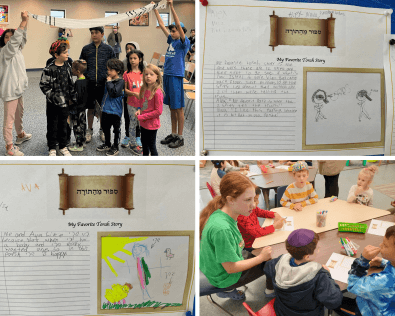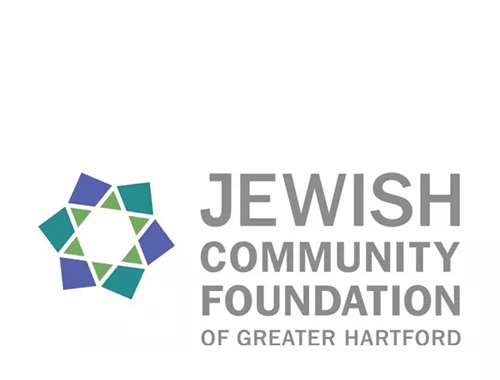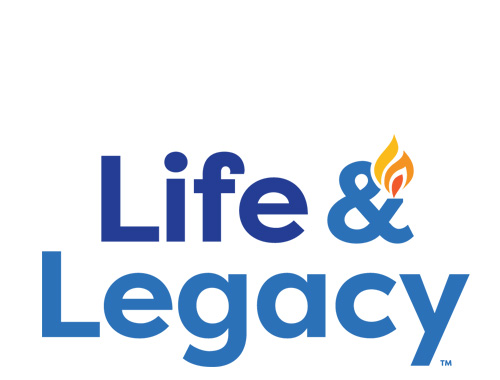Schechter Shavua: October 28, 2022
Mrs. Simon Shares Expertise with other Educators
Kol hakavod to Schechter Humanities teacher Colleen Simon , who recently delivered a presentation at the Connecticut Council for Social Studies to 40 history teachers from all over the state! The conference theme was Create, Innovate, and Inspire, and their vision is to develop inclusive Social Studies education for all students throughout Connecticut. Mrs. Simon was invited to present to this group of Social Studies educators by Dr. Aya Marczyk, Associate Research Scholar from the MacMillan Center at Yale University. Marczyk created a curriculum entitled “Race and Citizenship in Nazi Germany and Jim Crow US,” and Mrs. Simon both provided input for this unit and has taught parts of the curriculum during her eighth grade history class.
While teaching these lessons to her Schechter 8th graders, Mrs. Simon found that her students were thoroughly engaged, noting that they were grateful to be provided with information that was not "sugar coated." Mrs. Simon also discovered that because of this inquiry-based curriculum, the students were able to dig deeper into other primary documents and started noting what is mentioned and what is omitted during certain periods of history. It was because of Simon’s enthusiasm for this curriculum that Dr. Marczyk invited Mrs. Simon to present and share her experiences teaching this curriculum.
We are proud of Mrs. Simon for her dedication to this topic and for being recognized by others in the field as such a valuable resource!
Shevet Groups Have Torah Study During Chagim
 Students were excited to continue activities with their Shevet groups during Sukkot and Sim hat Torah. Rabbi Berger set the stage by reviewing the unique nature of Simh at Torah with the students, asking questions aimed at both younger and older children. Then, as a taste of what would take place in synagogues during the holiday, the whole school got to finish and re-start the Torah! Our eighth graders, who are nearing the end of their time at Schechter, said the blessings before Rabbi Berger read the last few verses of Devarim (Deuteronomy). Our oldest students then held tallitot over the heads of our younger students, who sang the blessings before hearing the first few verses of Bereishit(Genesis).
Students were excited to continue activities with their Shevet groups during Sukkot and Sim hat Torah. Rabbi Berger set the stage by reviewing the unique nature of Simh at Torah with the students, asking questions aimed at both younger and older children. Then, as a taste of what would take place in synagogues during the holiday, the whole school got to finish and re-start the Torah! Our eighth graders, who are nearing the end of their time at Schechter, said the blessings before Rabbi Berger read the last few verses of Devarim (Deuteronomy). Our oldest students then held tallitot over the heads of our younger students, who sang the blessings before hearing the first few verses of Bereishit(Genesis).
Following this beautiful service, the Shevet groups split into smaller units of two or three students. Each group contained at least one student from both middle school and lower school. Initially, the partners discussed which story from the Torah is their favorite and why, then students worked together on their artwork. Groups that contained a Kindergarten student discussed their favorite holiday, because the Ilanotclass is just starting to learn the different parashiot.
Great Teamwork Leads Scorpions to Victory
Kol hakavod to the Schechter Scorpions soccer team for wrapping up an undefeated season filled with great teamwork and enthusiasm! After celebrating a win on their home turf earlier this month, the Scorpions played a shutout game against the much larger team from Watkinson School last week. The match began at a frantic pace with lots of energy from both sides. By halftime, the score was 4-0. The Scorpions demonstrated great teamwork and conditioning, a result of both their weekly practices and additional soccer skills they polished in PE class with Coach Kee. In the second half, without a single sub on the bench, the determined offense scored four additional goals. Although Watkinson had possession of the ball at times, they were shut down by our defense, and the final score was 8-0.
Click HERE for photos of our super Scorpions
Parashat Noah — What Really Bothers God
 As a parent, it is frustrating to me when my children don’t do what I ask them to do. No one likes being ignored, or having to say things twice. But it’s even harder for me when they fight with each other. I have a younger brother and sister, and when we were growing up, we spent our fair share of time arguing, so I understand that siblings quarrel. But as a father, my children’s fights with each other pain me more than their failure to listen to me.
As a parent, it is frustrating to me when my children don’t do what I ask them to do. No one likes being ignored, or having to say things twice. But it’s even harder for me when they fight with each other. I have a younger brother and sister, and when we were growing up, we spent our fair share of time arguing, so I understand that siblings quarrel. But as a father, my children’s fights with each other pain me more than their failure to listen to me.
This pattern is true for me as an educator too. It’s never easy when my students don’t listen to me, but I have a much harder time when they are mean to each other.
Perhaps it was a similar feeling that led the rabbis to make an interesting point about God’s actions in Parashat Noah . The bulk of the parashahis concerned with the Flood; according to that story, God swept away most of creation, ending the lives of most of humanity. At the end of the parashah, we read about the Tower of Babel; in that story, God scatters humanity by scrambling their languages.
What spurred these two powerful divine reactions—and why was the Flood so much more severe? According to the Torah, the Flood came because the world was full of violence—people hurting each other. In contrast, the Tower of Babel represented a human attempt to glorify humanity; to the rabbis, its builders were trying to usurp God. When our relationship with God is warped or damaged, it clearly troubles God—but what God really can’t stand is when our relationships with each other become cruel, abusive or violent.
We need to strive for strong relationships with God and people. We can have both — it’s not a zero-sum game! But if we find ourselves putting all of our focus on God, Parashat Noah seems to tell us how God might feel about that.
Shabbat shalom,
Rabbi Jonathan Berger
Head of School
Questions for the Shabbat table:
1. Why does God hate it so much when we fight?
2. If you are a parent: what exactly is so upsetting about when our children fight? If you are a child: which is harder to avoid, fighting with a sibling or friend, or arguing with parents? Why?
Solomon Schechter Day School
of Greater Hartford
26 Buena Vista Road
West Hartford, CT 06107
© Solomon Schechter Day School of Greater Hartford | Site design Knowles Kreative




